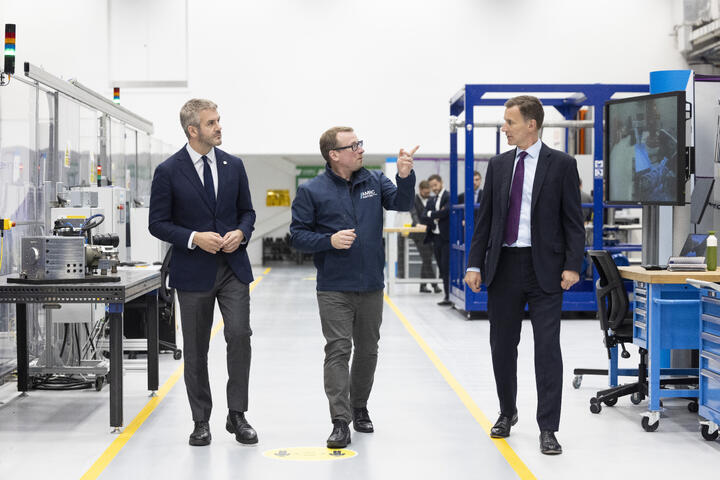Why COMPASS matters
13 October 2023By Steve Foxley, CEO, University of Sheffield AMRC
Article featured in the latest issue of the AMRC Journal.
When we look back, July 2023 will be important in the AMRC’s history for two reasons; firstly for winning project COMPASS (Composites at Speed and Scale), which is the largest research development programme in the AMRC’s history; and secondly for securing the anchor project for the UK government’s first investment zone, which will be here in South Yorkshire.
I’m so proud of what the project COMPASS team has achieved but I’m especially proud of how they have achieved it. The AMRC team has battled many headwinds, picked themselves up when they hit setbacks, and yet the team has ultimately managed to secure another seed of innovation with huge potential for the UK.
I’m not exaggerating when I say this could be one of the most significant regeneration projects for the UK and that it could have an impact that is three or four times bigger than the impact the AMRC has made, so far, over the past 20 years.
The original AMRC innovation seed in 2001 was focussed on machining of aerospace alloys; this seed in 2023 is focussed on the automated manufacture of large-scale, high-rate composite components.
There is a lot of content later in this edition of the Journal that explains more about the goals of project COMPASS and what it wants to achieve, so I’m going to focus on why COMPASS is important for the planet, for the country and for the region.
For the planet, the technology will ultimately support innovation in many critical UK sectors, such as aerospace, automotive, defence and offshore wind. For example, in the aerospace sector, the innovation at the heart of COMPASS will be a key enabling technology to manufacture lighter aircraft, reduce energy consumption in manufacture and increase fuel efficiency in flight - whether electric, hydrogen or sustainable aviation fuels. This innovation develops enabling technologies to support FlyZero - the UK government-backed programme exploring the future of zero-carbon emission air travel - addressing how we decarbonise aerospace, which is one of the hardest sectors to decarbonise.
For the country, the UK was up against stiff global competition for this opportunity from Germany, Japan and the US and so it’s important to recognise the world-leading nature of the UK’s composite research and innovation. Project COMPASS adds capability to the UK’s composite assets and strengthens our national capability.
The research and equipment complements the existing world-leading capabilities which the High Value Manufacturing Catapult has in composites, in particular at the National Composites Centre in Bristol, which is one of our sister centres that makes up the incredible HVM Catapult network.
For the region, this project will strengthen the growing green aerospace cluster that is developing across South Yorkshire.
The region already has world-class capabilities in aerospace, including but not limited to the Boeing and Rolls-Royce manufacturing sites that sit alongside us here on the Advanced Manufacturing Park, and the many critical supply chain companies across Sheffield and Rotherham. But with the recent announcement from Hybrid Air Vehicles to create a manufacturing facility in the region, and now with COMPASS, the cluster is building out.
Regionally, the icing on the cake was that COMPASS was an instrumental part of the Chancellor of the Exchequer coming to Factory 2050 to announce the UK’s first investment zone, right here in South Yorkshire. The Mayor of South Yorkshire, Oliver Coppard, and his team have worked hard to be the first to announce an investment zone. From the government’s five key growth areas, they have selected advanced manufacturing as the anchor theme for the South Yorkshire Investment Zone.
These investment zones are focussed around innovation clusters and their aim is to be a catalyst to create new business opportunities and jobs. We’re good at this in South Yorkshire and at the AMRC; the investment zone will give us the opportunity to do more of what we’ve done over the past two decades in regenerating the region. As the mayor has publicly stated, the aspiration is to use the investment zone funding to leverage £1.2bn of investment into South Yorkshire and create thousands of jobs.
It is opportunities and innovation like this that are the foundations upon which we deliver the AMRC’s purpose of ‘transforming lives through innovation’.
So what’s the next step? Well, the bidding phase is now over, and the hard work of implementation begins. By early 2025, the new facility needs to be built and the equipment in operation. Our first research programme will be with the AMRC’s founding partner Boeing, in partnership with Spirit AeroSystems and Loop Technology. The research has already started. We’re excited. It’s a thrilling area of innovation and our teams in composites and integrated manufacturing are up more than up for the challenge.

